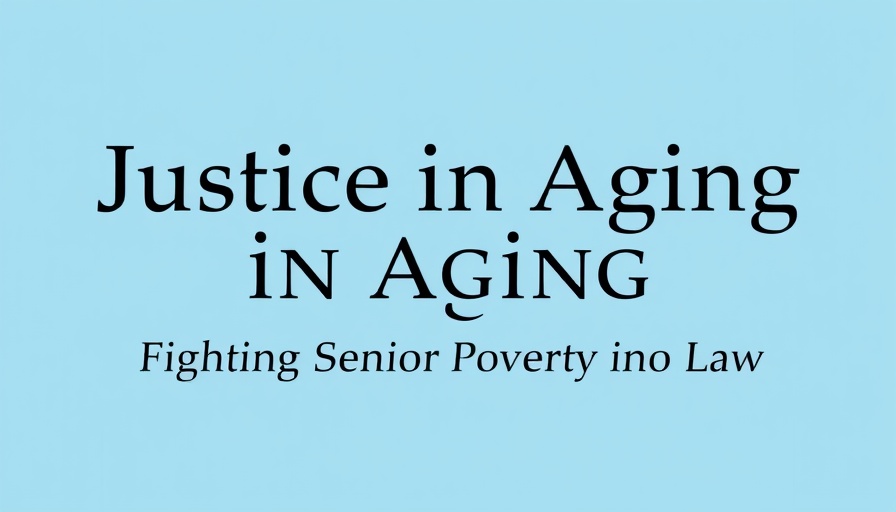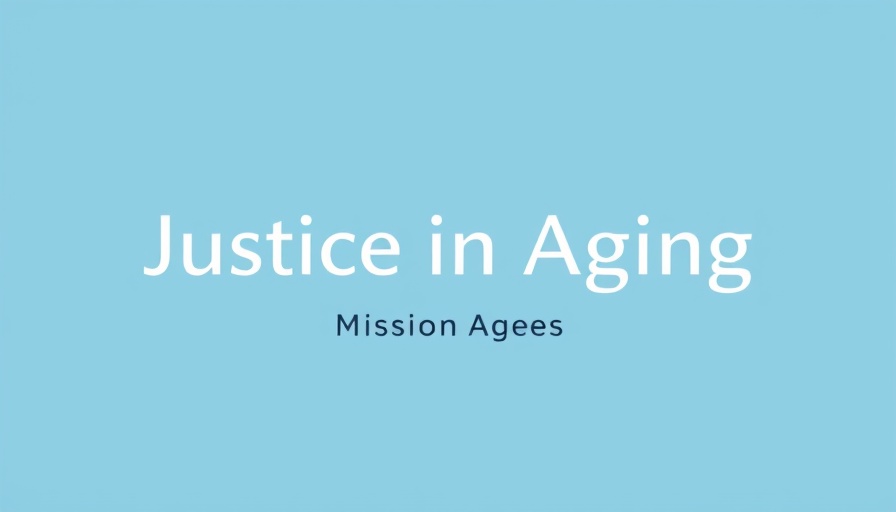
Understanding Ageism in Healthcare: A Call for Action
The issue of ageism in healthcare has been a silent yet pervasive concern affecting the treatment and perception of aging individuals in medical settings. Recent comments submitted by Justice in Aging to the Agency for Healthcare Research and Quality (AHRQ) shed light on this pressing issue, calling for an urgent reevaluation of how society views and treats its older population.
The Impact of Ageism on Seniors' Health
Ageism manifests in various ways within healthcare, from biased assumptions about the capabilities of older adults to inadequate treatment options tailored for their specific needs. Seniors often report being overlooked in conversations about their health, leading to misdiagnoses and insufficient care. Research indicates that ageist attitudes among healthcare providers can result in fewer services offered to older patients, thereby adversely affecting their health outcomes.
A Historical Perspective on Ageism
Historically, society has had a troubled relationship with aging, promoting stereotypes that suggest older adults are frail, forgetful, or incapable. Such stereotypes create a narrative that undermines the capabilities of seniors, shaping the interactions they have with healthcare providers. Acknowledging the historical context of ageism is vital as we advocate for changes in healthcare policies and practices that better serve older populations.
Future Trends: A Shift Towards Inclusivity in Healthcare
As the demographics of our society shift towards an older population, there is an increasing recognition of the need for healthcare practices that are inclusive and respectful of seniors. The AHRQ's request for information aims to gather insights that could lead to transformative changes in how healthcare systems treat aging individuals. There is a growing movement to train healthcare professionals in age-friendly practices, emphasizing the importance of seeing the person, not just the age.
Counterarguments: Addressing Common Misconceptions
While many acknowledge the prevalence of ageism, some argue that it is not a significant issue, claiming that older adults receive adequate care. However, this perspective can overlook the nuanced experiences of seniors who may experience a lack of appropriate treatments or dismissive attitudes from medical staff. By challenging these misconceptions, we can deepen our understanding of the barriers that older adults face in healthcare settings.
Actionable Insights: What Can be Done?
Addressing ageism in healthcare requires a multifaceted approach: advocacy for policy changes, increasing awareness among healthcare providers, and encouraging seniors to speak up about their experiences. Healthcare institutions must implement training programs focusing on age-related biases and adopt inclusive practices to ensure that the needs of older patients are met effectively and respectfully.
Emotional Responses: The Senior Experience
For many seniors, experiencing ageism in healthcare can lead to feelings of invisibility and frustration. It is crucial to recognize the human aspect of these issues and the emotional toll taken on older adults who feel sidelined. By promoting empathy within healthcare, we can foster environments where seniors feel valued and respected as integral members of the healthcare system.
Engaging with Community Resources
Various organizations and community resources aim to tackle ageism and promote age-friendly healthcare practices. Seniors are encouraged to engage with these resources and advocate for their rights. Through collective efforts, we can foster a healthcare landscape that honors the dignity and capability of every aging individual.
In conclusion, the comments submitted by Justice in Aging serve as a crucial step in advocating for the rights and treatment of older adults within healthcare systems. As we move forward, it is essential for everyone—policymakers, healthcare providers, and seniors themselves—to work collaboratively towards dismantling ageism, enriching the healthcare experience for all involved.
Call to Action: Join the movement towards age-inclusive healthcare. Advocate for policy changes, share your story, or connect with local organizations committed to improving the health and wellbeing of seniors in your community.
 Add Row
Add Row  Add
Add 




 Add Row
Add Row  Add
Add 

Write A Comment